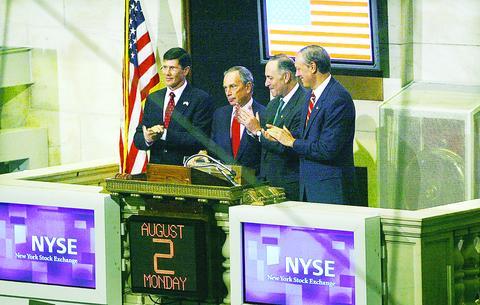On a day of trading clouded by fears of a potential terrorist attack, John Thain, the chief executive of the New York Stock Exchange, announced on Monday his long awaited plan to increase electronic trading that could diminish the historic role of floor traders.
His proposal, which will allow institutional investors to trade large blocks of stock electronically, is a radical shift for the exchange and its 1,366 members.

PHOTO: AFP
It is all the more ambitious for being introduced during a time of nervousness in the markets spurred by the onset of rising interest rates, terrorist threats and political uncertainty.
After the weekend news that the exchange and other financial institutions were possible targets of terrorist attacks, New York's leading politicians were at the exchange on Monday morning, from Senator Charles Schumer, a Democrat, who greeted traders as they entered the building in the morning, to Governor George Pataki and Mayor Michael Bloomberg who rang the opening bell.
"We are open for business," Thain said Monday as he stood before the statue of George Washington on the steps of monument hall, with Schumer beside him.
Missing from Thain's clipped, to-the-point remarks was the patriotic oratory that his predeces-sor, Richard Grasso, favored, especially in the aftermath of the Sept. 11 terror attacks.
But for Thain, a former president of Goldman Sachs who directed the firm's aggressive investments in electronic trading, his expertise lies less in promoting the exchange and more in mastering the technological details of his new plan and persuading the Big Board's many constituencies to adopt it.
Defenders of the New York Stock Exchange's two-centuries-old open outcry system, which relies on specialist traders to use their trading acumen and capital to help investors find the best price for a stock, say that now, more than ever, the experience and know-how of the floor trader is needed to ensure price stability.
At a news conference on Monday, however, Thain said the new program, which is called Direct Plus, was designed so that large institutional investors such as Fidelity and American Century would conduct more of their electronic trades with the New York Stock Exchange.
"If we didn't respond to our customer base," Thain said. "They would pull their volume off and trade on the electronic markets."
The stock exchange's market share is currently 80 percent, having dipped to a low of 75 percent in January during the controversy over Grasso's pay.
Institutional investors have long complained that they cannot trade with speed and anonymity at the exchange and, as a result, they have channeled much of their trading to the Big Board's electronic competitors.
A draft of the Direct Plus proposal was sent to the Securities and Exchange Commission, the exchange's main regulator, on Monday for approval.
Thain said he expected the new version of Direct Plus to become operational within six to 12 months.

SECURITY: As China is ‘reshaping’ Hong Kong’s population, Taiwan must raise the eligibility threshold for applications from Hong Kongers, Chiu Chui-cheng said When Hong Kong and Macau citizens apply for residency in Taiwan, it would be under a new category that includes a “national security observation period,” Mainland Affairs Council (MAC) Minister Chiu Chui-cheng (邱垂正) said yesterday. President William Lai (賴清德) on March 13 announced 17 strategies to counter China’s aggression toward Taiwan, including incorporating national security considerations into the review process for residency applications from Hong Kong and Macau citizens. The situation in Hong Kong is constantly changing, Chiu said to media yesterday on the sidelines of the Taipei Technology Run hosted by the Taipei Neihu Technology Park Development Association. With

CARROT AND STICK: While unrelenting in its military threats, China attracted nearly 40,000 Taiwanese to over 400 business events last year Nearly 40,000 Taiwanese last year joined industry events in China, such as conferences and trade fairs, supported by the Chinese government, a study showed yesterday, as Beijing ramps up a charm offensive toward Taipei alongside military pressure. China has long taken a carrot-and-stick approach to Taiwan, threatening it with the prospect of military action while reaching out to those it believes are amenable to Beijing’s point of view. Taiwanese security officials are wary of what they see as Beijing’s influence campaigns to sway public opinion after Taipei and Beijing gradually resumed travel links halted by the COVID-19 pandemic, but the scale of

A US Marine Corps regiment equipped with Naval Strike Missiles (NSM) is set to participate in the upcoming Balikatan 25 exercise in the Luzon Strait, marking the system’s first-ever deployment in the Philippines. US and Philippine officials have separately confirmed that the Navy Marine Expeditionary Ship Interdiction System (NMESIS) — the mobile launch platform for the Naval Strike Missile — would take part in the joint exercise. The missiles are being deployed to “a strategic first island chain chokepoint” in the waters between Taiwan proper and the Philippines, US-based Naval News reported. “The Luzon Strait and Bashi Channel represent a critical access

Pope Francis is be laid to rest on Saturday after lying in state for three days in St Peter’s Basilica, where the faithful are expected to flock to pay their respects to history’s first Latin American pontiff. The cardinals met yesterday in the Vatican’s synod hall to chart the next steps before a conclave begins to choose Francis’ successor, as condolences poured in from around the world. According to current norms, the conclave must begin between May 5 and 10. The cardinals set the funeral for Saturday at 10am in St Peter’s Square, to be celebrated by the dean of the College